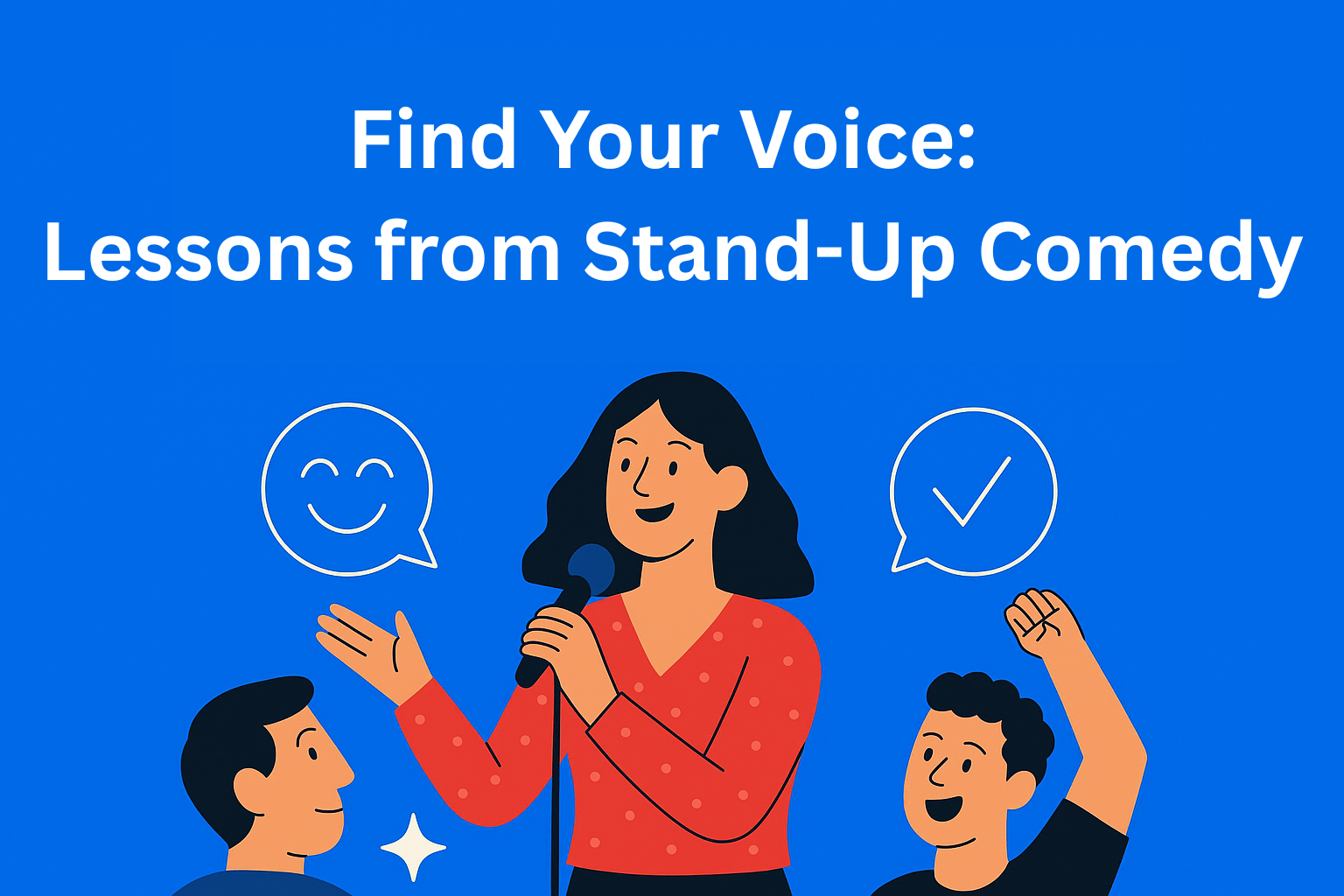What Stand-Up Comedy Can Teach You About Finding Your Voice
Stand-up comedy teaches marketers and creators that finding your voice isn’t about what you say, it’s how you say it. Discover how comedians use rhythm, honesty, and real-life observation to craft an authentic, unforgettable style that connects and inspires.

Most marketers spend hours thinking about what to say. But stand-up comedians remind us that it’s actually how you say something that makes people listen. When a comedian steps on stage, it’s not just the jokes that make the audience laugh - it’s the rhythm, tone, and energy behind the words. That’s their unique voice.
Finding your voice in writing or content creation works the same way. It’s not about sounding perfect; it’s about sounding like yourself. In this blog, we’ll explore what stand-up comedy can teach us about developing an authentic, original, and personal way of communicating.
Key Takeaways
- Test in public - Like comedians, publish often, watch reactions, and adjust your tone based on real feedback.
- Embrace your quirks - The things that make your writing “weird” are often what make it memorable and relatable.
- Stay curious and observe life - Everyday moments can spark meaningful, human content when viewed with a comedian’s eye.
- Play with rhythm and tone - The pacing and flow of your words matter as much as what you say. Read it aloud to feel the voice.
- Be vulnerable - Honesty, not perfection, builds trust. Don’t fear awkward posts, they help you grow.
1. Test Your Material Like a Comedian
No great comedian writes the perfect joke on the first try. They go to small clubs, test their material in front of live audiences, and adjust based on the reactions. If a joke doesn’t land, they don’t throw it away - they rewrite it, change the order, or adjust the timing. Over time, the routine matures.
The same goes for content creation. If you want to find your voice, you can’t do it alone. You need real reactions from real people. Publish regularly and observe what grabs your audience’s attention. Which posts get shared, which start conversations, and which get ignored? Every reaction means something.
Think of your writing as a live performance. Your “stage” might be your blog, newsletter, or social media, but the principle is the same: you find your rhythm through practice and audience feedback. Like comedians, creators improve faster when they learn to test, listen, and adapt.
When you think this way, finding your voice stops feeling complicated. It becomes a simple process of trying, observing, and learning.
2. Your Quirks Are Your Brand
Think of your favorite comedian. Maybe it’s their weird expressions, awkward pauses, or dry humor that make them memorable. They don’t hide those quirks - they highlight them. Those traits make their performances unique.
The same applies to writing and marketing. Many people try to hide their personality because they think it sounds strange or unprofessional. But in truth, what makes you different is what makes you special. If you write short and clear sentences - keep them that way. If your humor is subtle - don’t change it. If you prefer storytelling to statistics - make that your strength.
People connect with people, not perfect robots. Honesty builds trust. In a noisy world, the best strategy is to stay true to yourself.
So next time you write something, ask yourself: does this sound like me? If your name were removed, would someone who knows you still recognize your tone? That’s what a real voice does - it turns content into a signature.
3. Observe Life Like a Comedian
Comedians are professional observers. They take everyday moments - ordering coffee, chatting with friends, getting stuck in traffic - and turn them into something meaningful or funny. Their secret isn’t living an extraordinary life but noticing ordinary things others overlook.
This is one of the most important habits for any creator. Inspiration doesn’t always come from big events or deep research. It comes from small details and human moments. Maybe it’s how a coworker reacts to stress, how people talk on the bus, or your own thoughts when you’re tired. Every little thing can become a story or a lesson.
When you learn to observe life this way, your writing becomes simpler and more genuine. You connect with people - not just through data, but through shared experiences.
4. Rhythm, Tone, and Presence Matter
Comedy is all about timing. The same joke can make one audience laugh or leave another silent - it depends on how it’s told. The pause before the punchline, the speed of delivery, the energy in the voice - all of these shape how the message lands.
Writers often forget this, but written text has rhythm too. Short sentences create tension, long ones bring calm. A new paragraph feels like a pause, and even punctuation can change the tone.
If you want your writing to sound alive, read it out loud. Does it flow naturally? Does it sound like a conversation? The simpler you write, the easier it is for readers to connect.
Remember: people don’t just read words - they feel the tone. A good rhythm and tone can turn plain text into a story.
5. Vulnerability Is Part of the Craft
Every comedian has “bombed” on stage at least once. They’ve told a joke that didn’t work, stood in silence, and had to handle the awkwardness. But those moments build their confidence. They learn what works by daring to fail in public.
As a content creator, you’ll face similar moments. You might post something that gets no attention or write something that feels too personal. But those risks are important for your growth. You can’t find your true voice if you’re afraid to show weakness.
When you share something real - an experience, a mistake, or a doubt - people listen. Honesty is rare, and that’s why it stands out. Originality doesn’t come from perfection; it comes from honesty. The more open you are, the clearer and more recognizable your voice becomes.
6. Finding Your Voice Is a Journey, Not a Destination
Comedians never stop evolving. Even after years of success, they keep writing, testing, and refining their material. They understand that their voice grows with them.
The same goes for you. You don’t need to have a perfect style right away. It will develop naturally as you create. Every blog post, social media update, or video is another performance on your stage. Over time, your rhythm and storytelling will become distinct.
Your voice isn’t something you find once - it’s something you build, step by step, through curiosity and persistence.
7. Key Lessons from the Stage
- Test in public - Share often, learn from feedback, and adjust your tone.
- Embrace your quirks - What feels strange to you might be what your audience loves most.
- Stay curious - Everyday life is full of insights waiting to become stories.
- Play with rhythm - Tone, pace, and sentence flow can make dry text engaging.
- Be vulnerable - The more honest you are, the stronger your connection with readers.
Finding your voice isn’t about copying others or chasing trends. It’s about learning to sound like yourself - with confidence and clarity.
Conclusion: Comedy as a School of Authenticity
Comedy isn’t just about being funny. It’s about being real. Great comedians don’t hide behind their jokes - they use humor to show who they are. And that’s why audiences trust them.
If your writing ever feels like it could have been written by anyone, look to comedy for inspiration. It will teach you to test your work, trust your instincts, and lean into your humanity.
Because in the end, the goal isn’t to sound clever. The goal is to sound unmistakably you. And once you do, your voice becomes your most powerful marketing tool.






